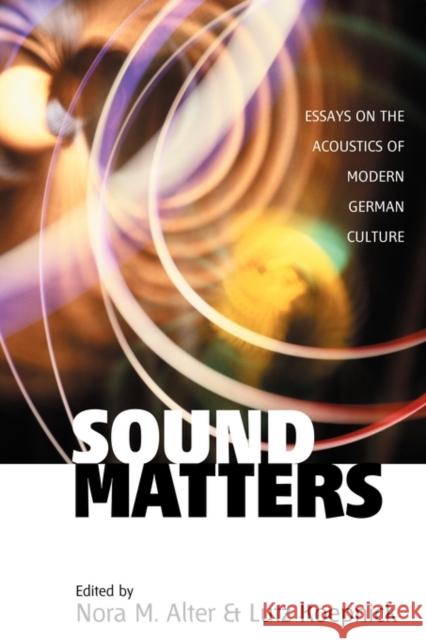Sound Matters: Essays on the Acoustics of German Culture » książka
Sound Matters: Essays on the Acoustics of German Culture
ISBN-13: 9781571814371 / Angielski / Miękka / 2005 / 266 str.
The sounds of music and the German language have played a significant role in the developing symbolism of the German nation. In light of the historical division of Germany into many disparate political entities and regional groups, German artists and intellectuals of the 19th and early 20th centuries conceived of musical and linguistic dispositions as the nation's most palpable common ground. According to this view, the peculiar sounds of German music and of the German language provided a direct conduit to national identity, to the deepest recesses of the German soul. So strong is this legacy of sound is still prevalent in modern German culture that philosopher Peter Sloterdijk, in a recent essay, did not even hesitate to describe post-wall Germany as an "acoustical body." This volume gathers the work of scholars from the US, Germany, and the United Kingdom to explore the role of sound in modern and postmodern German cultural production. Working across established disciplines and methodological divides, the essays of Sound Matters investigate the ways in which texts, artists, and performers in all kinds of media have utilized sonic materials in order to enforce or complicate dominant notions of German cultural and national identity. Nora M. Alter is Professor of German, Film and Media Studies at the University of Florida. She is author of Vietnam Protest Theatre: The Television War on Stage (Indiana UP, 1996) and Projecting History: German Non-Fiction Film 1967-2000, (University of Michigan Press, 2002). Lutz Koepnick is Associate Professor of German, Film and Media Studies at Washington University in St. Louis. He is the author of Walter Benjamin and the Aesthetics of Power (The University of Nebraska Press, 1999), for which he received the MLA's Aldo and Jeanne Scaglione Prize for Studies in Germanic Languages and Literatures in 2000.
The sounds of music and the German language have played a significant role in the developing symbolism of the German nation. In light of the historical division of Germany into many disparate political entities and regional groups, German artists and intellectuals of the 19th and early 20th centuries conceived of musical and linguistic dispositions as the nations most palpable common ground. According to this view, the peculiar sounds of German music and of the German language provided a direct conduit to national identity, to the deepest recesses of the German soul. So strong is this legacy of sound is still prevalent in modern German culture that philosopher Peter Sloterdijk, in a recent essay, did not even hesitate to describe post-wall Germany as an "acoustical body." This volume gathers the work of scholars from the US, Germany, and the United Kingdom to explore the role of sound in modern and postmodern German cultural production. Working across established disciplines and methodological divides, the essays of Sound Matters investigate the ways in which texts, artists, and performers in all kinds of media have utilized sonic materials in order to enforce or complicate dominant notions of German cultural and national identity. Nora M. Alter is Professor of German, Film and Media Studies at the University of Florida. She is author of Vietnam Protest Theatre: The Television War on Stage (Indiana UP, 1996) and Projecting History: German Non-Fiction Film 1967-2000, (University of Michigan Press, 2002). Lutz Koepnick is Associate Professor of German, Film and Media Studies at Washington University in St. Louis. He is the author of Walter Benjamin and the Aesthetics of Power (The University of Nebraska Press, 1999), for which he received the MLAs Aldo and Jeanne Scaglione Prize for Studies in Germanic Languages and Literatures in 2000.











